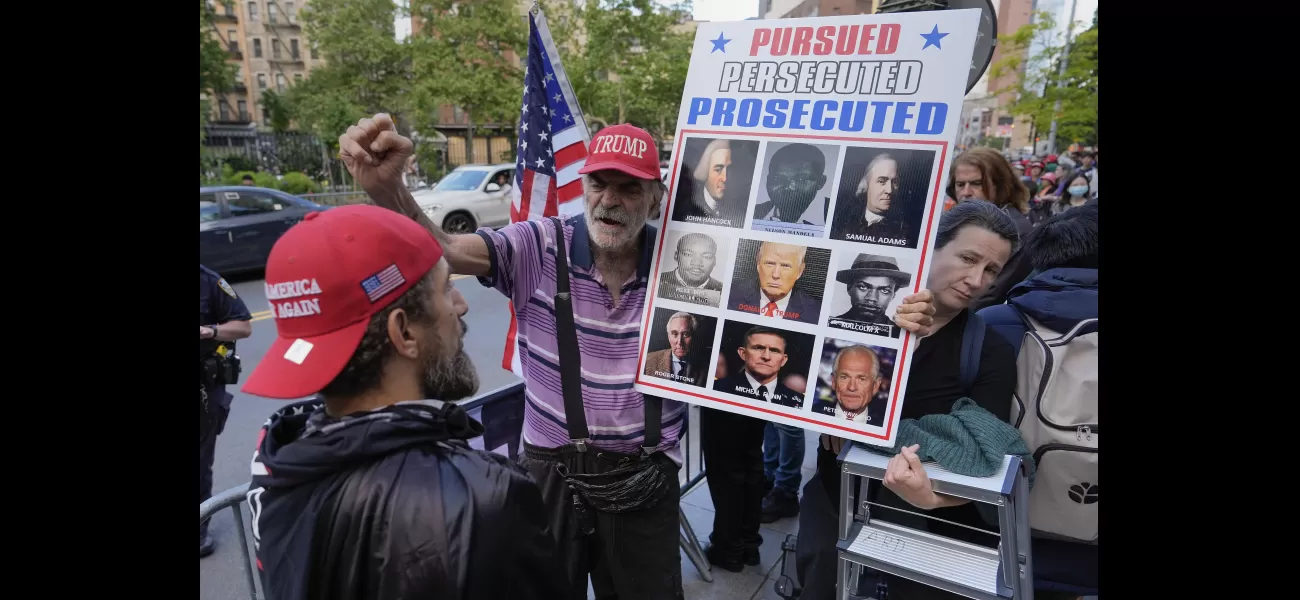Ruling's impact on potential presidency run.
After being found guilty of 34 counts of falsifying business records by a New York jury, the question arises: Can a felon become president?
May 30th 2024.

After a New York jury convicted former President Donald Trump of all 34 felony charges of falsifying business records, many are wondering what this means for his future in politics. The most pressing question on everyone's mind is whether a convicted felon can run for president.
The answer to that question is yes. The US Constitution sets out just three requirements for presidential candidates: they must be a natural born citizen, at least 35 years old, and have been a resident of the US for at least 14 years. Since Trump meets all three of these requirements, he is eligible to run for president despite his felony convictions.
There is a fourth requirement that some may argue disqualifies Trump from holding public office. The 14th Amendment states that anyone who has previously taken an oath of office and engaged in insurrection cannot hold a position of power in the US. However, the Supreme Court has ruled that Congress would need to pass a special law invoking this prohibition, which is not likely to happen.
In fact, there is precedent for presidential campaigns being run from prison cells. In 1920, Socialist leader Eugene Debs ran for president while serving a 10-year sentence for sedition. Despite his imprisonment, Debs received almost a million votes, showing that even a convicted felon can garner significant support in a presidential election.
But what about the more complicated question: can a convicted felon vote for themselves in a presidential election? The answer to that question is not as straightforward. Each state has its own rules and regulations regarding felons' voting rights. Some states, like Vermont and Maine, allow felons to vote from prison, while others have laws in place that restrict felons' right to vote.
In Florida, where Trump is now a resident, there has been movement towards reenfranchising convicted felons. However, the state's Republican lawmakers have added requirements that felons must pay all fines and fees associated with their sentence before being allowed to vote. This could potentially be an obstacle for Trump if he is sentenced to prison time and has not yet paid these fees by the time of the election.
Despite these potential roadblocks, most experts believe that Trump will have no issue voting in the upcoming election. In Florida, the state defers to the jurisdiction of the felony conviction, meaning that Trump's right to vote would depend on whether he is incarcerated at the time of the election. In New York, a new law passed in 2021 states that any convicted felon who is not currently in prison is eligible to register to vote.
Even if Trump is sentenced to prison time, it is unlikely that his right to appeal his conviction would be exhausted before the election. However, if he were to be convicted in one of the two federal criminal cases against him before Election Day, that could potentially change the outcome.
There are also other issues that could affect felons' ability to vote in Florida, such as confusion about the fees and fines required to regain their voting rights. However, organizations like the Florida Rights Restoration Coalition are working to make it easier for formerly incarcerated individuals to confirm their eligibility and exercise their right to vote.
In conclusion, while Trump's felony convictions may raise questions about his future in politics, they do not automatically disqualify him from running for president. As long as he meets the constitutional requirements and is not currently incarcerated, he is eligible to run for office and vote in the upcoming election.
The answer to that question is yes. The US Constitution sets out just three requirements for presidential candidates: they must be a natural born citizen, at least 35 years old, and have been a resident of the US for at least 14 years. Since Trump meets all three of these requirements, he is eligible to run for president despite his felony convictions.
There is a fourth requirement that some may argue disqualifies Trump from holding public office. The 14th Amendment states that anyone who has previously taken an oath of office and engaged in insurrection cannot hold a position of power in the US. However, the Supreme Court has ruled that Congress would need to pass a special law invoking this prohibition, which is not likely to happen.
In fact, there is precedent for presidential campaigns being run from prison cells. In 1920, Socialist leader Eugene Debs ran for president while serving a 10-year sentence for sedition. Despite his imprisonment, Debs received almost a million votes, showing that even a convicted felon can garner significant support in a presidential election.
But what about the more complicated question: can a convicted felon vote for themselves in a presidential election? The answer to that question is not as straightforward. Each state has its own rules and regulations regarding felons' voting rights. Some states, like Vermont and Maine, allow felons to vote from prison, while others have laws in place that restrict felons' right to vote.
In Florida, where Trump is now a resident, there has been movement towards reenfranchising convicted felons. However, the state's Republican lawmakers have added requirements that felons must pay all fines and fees associated with their sentence before being allowed to vote. This could potentially be an obstacle for Trump if he is sentenced to prison time and has not yet paid these fees by the time of the election.
Despite these potential roadblocks, most experts believe that Trump will have no issue voting in the upcoming election. In Florida, the state defers to the jurisdiction of the felony conviction, meaning that Trump's right to vote would depend on whether he is incarcerated at the time of the election. In New York, a new law passed in 2021 states that any convicted felon who is not currently in prison is eligible to register to vote.
Even if Trump is sentenced to prison time, it is unlikely that his right to appeal his conviction would be exhausted before the election. However, if he were to be convicted in one of the two federal criminal cases against him before Election Day, that could potentially change the outcome.
There are also other issues that could affect felons' ability to vote in Florida, such as confusion about the fees and fines required to regain their voting rights. However, organizations like the Florida Rights Restoration Coalition are working to make it easier for formerly incarcerated individuals to confirm their eligibility and exercise their right to vote.
In conclusion, while Trump's felony convictions may raise questions about his future in politics, they do not automatically disqualify him from running for president. As long as he meets the constitutional requirements and is not currently incarcerated, he is eligible to run for office and vote in the upcoming election.
[This article has been trending online recently and has been generated with AI. Your feed is customized.]
[Generative AI is experimental.]
0
0
Submit Comment





